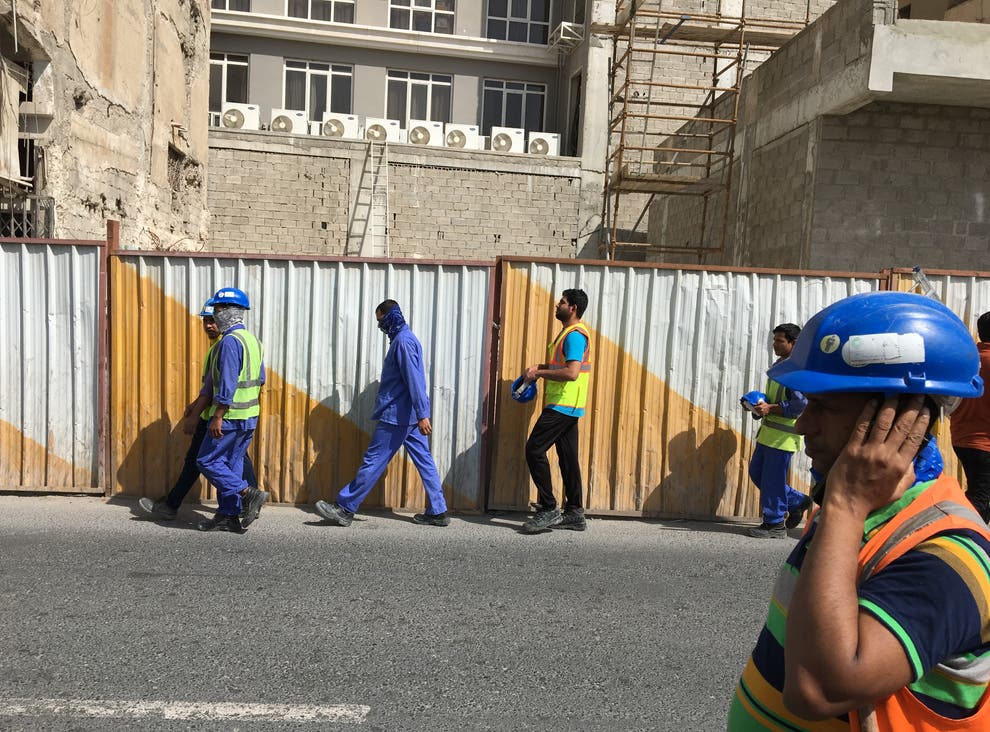Amnesty claims ‘clock is ticking’ on Qatar labour reform and urges David Beckham to put pressure on Doha
Despite reforms, workers still find themselves ‘bound’ to abusive bosses under the system, claims Amnesty

Amnesty International has warned that workers in Qatar are still being exploited and labour reform has stalled with just a year to go until the World Cup.
A report from the rights group, released the day after England secured qualification for the tournament, accuses the Gulf state of “complacency” in enforcing much-needed changes to the country’s long-criticised labour system.
It is calling on football’s governing body, Fifa, and even former England captain David Beckham, who is said to have signed a deal with Doha to be a high-profile ambassador for the tournament, to do all it can to ensure Qatar fulfills its promises on labour reform.
The report – Reality Check 2021 – claims that restrictive laws stopping migrant workers leaving the country or changing jobs without their employer’s permission, and which were scrapped last year, have not been enforced strongly enough, so exploitation continues.
It quotes one female worker, Aisha, claiming she was threatened by her boss when she said she wanted to change jobs.
The woman was told she had to pay more than £1,000 – five times her monthly salary – to obtain a no-objection certificate, the paperwork needed to switch employment, and was also threatened with deportation.
Aisha’s complaint about her boss was rejected by the Ministry of Administrative Development, Labour and Social Affairs.
She told Amnesty: “The whole situation had a big impact on me but also on my family because as a main breadwinner it is not easy to handle this situation. Sometimes I feel I do not want to wake up in the morning.”
While the need for no-objection certificates has been abolished in law, organisations supporting migrant workers say failure to include a form of permission from the current boss seems to increase the chance of a transfer request being rejected.
This in turn has fuelled a lucrative “no-objection certificate trade” for some abusive employers.
As a result, Amnesty says that “time is running out” for officials to deliver on those pledges, ahead of the World Cup, which begins on 21 November next year. It said that progress to make labour reforms has stagnated over the last year and “old abusive practices have resurfaced”.
It also said David Beckham should use his “unique worldwide profile” to put pressure on human rights issues.
Some two million workers from overseas, many from south Asia, are employed in Qatar. A large number work on huge infrastructure projects helping to prepare the country for the World Cup.
Qatar has spent billions on building or refurbishing eight stadiums for the tournament as well as building such things as a rail system, roads, and hotels for the World Cup.
Other reforms introduced over the past few years include regulating working hours for live-in domestic workers, a system to ensure wages are paid as well as the introduction of a minimum wage. However, Qatar has not recognised the right of migrant workers to join unions.
The most common abusive practice by exploitative bosses is the withholding of salaries and benefits to make it harder for workers to leave their jobs, Amnesty claimed.
Migrant workers who flee their employers are also often subjected to “absconding” charges and cancellation of their residence permits.

Mark Dummett, Amnesty International’s Global Issues programme director, said: “The clock is ticking but it’s not too late to turn the ink on paper into real action.
“Now is the time for the Qatari authorities to be bold and fully embrace their programme of labour reforms; any progress to date will be wasted if Qatar settles for weak implementation of policies and fails to hold abusers to account.”
In response, Qatar rejected Amnesty’s claims and said more than 240,000 workers had been able to change jobs since the new laws were introduced.
“Amnesty fails to document a single story from among the 242,870 workers who have successfully changed jobs since barriers were removed in September 2020, or from the more than 400,000 workers who have directly benefitted from the new minimum wage through salary increases and other financial incentives,” Qatar’s labour ministry said.
Join our commenting forum
Join thought-provoking conversations, follow other Independent readers and see their replies
Comments


Bookmark popover
Removed from bookmarks